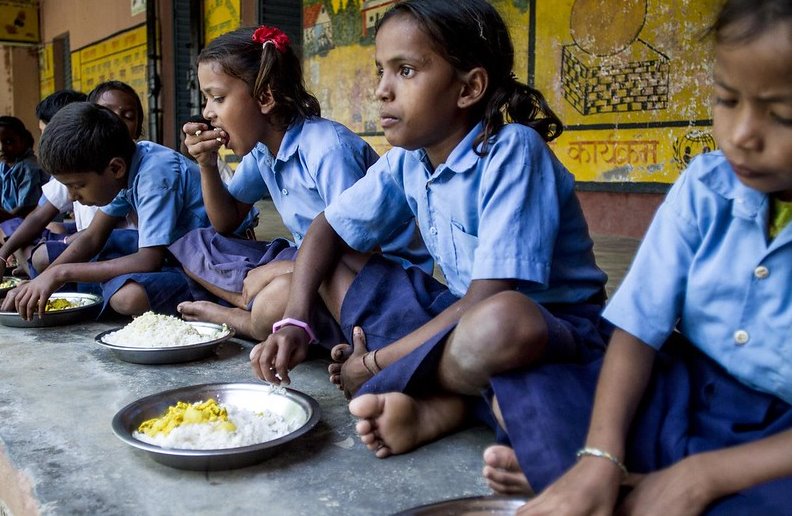The central government has announced Rs 1,200 crore [Rs 12,000 million] to be given to 118 million children across the country who are enrolled under the mid-day meal scheme. In other words, Rs 100 will be given per child as a one-time payment through direct benefit transfer (DBT).
This was announced by the Union Education Minister Ramesh Pokhriyal ‘Nishank’ on May 28. As per his statement, the central government will provide these ‘additional’ funds to state governments and Union Territories administration.
About 11.8 crore students to be benefited as GoI to provide Monetary Assistance through Direct Benefit Transfer (DBT) under the MDM Scheme. An additional fund of about Rs. 1200 Cr to be provided for this purpose. (1/5)
— Dr. Ramesh Pokhriyal Nishank (@DrRPNishank) May 28, 2021
This additional allocation is expected to take care of the nutritional needs of children as schools are shut for more than a year now due to the COVID19 pandemic. Under the mid-day meal scheme of the Indian government, students in government schools receive free cooked hot meals once a day.
Also Read: What is the cost of childhood wasting and severe acute malnutrition in India?
However, health and nutrition experts are dissatisfied with the central government’s recent announcement.
“The amount is just hundred rupees per child. This is also a one time investment, how can one ensure nutritional security through this?” asked Dipa Sinha, assistant professor, Dr BR Ambedkar University, Delhi. She is also associated with the Right To Food Campaign.
“Half of the money will be spent in going and withdrawing the money from the banks,” Sinha told Gaon Connection.
Meanwhile, the Union Ministry claims this decision will help ‘safeguard the nutritional levels of children and aid in protecting their immunity during the challenging pandemic times.’
This initiative aims to benefit around 118 million children for Class I to VIII studying in 1.18 million government-aided schools across the country.
Also Read: Women ‘Poshan Champions’ tackle malnutrition while puncturing patriarchy
Mid-day meal scheme
The National Food Security Act, 2013, guarantees children aged 6-14 years or up to Class VIII, one free mid-day meal every day (except on school holidays) in all schools run by local bodies, government and government-aided schools to meet certain nutritional standards.
In case of non-supply of the entitled quantities of foodgrains or meals to entitled persons under the Act, such persons are entitled to receive food security allowance from the concerned state government to be paid to each person.
The central government gives an allowance to the states. Latter can hand it over in the form of dry ration or as cash assistance to children.
Also Read: Waste and Want: 50 kg of food a person wasted every year, while 14% Indians malnourished
“The amount [Rs 100 per child] is too little to ensure any nutritional impact at all. Hundred rupees per child is not really meaningful, it is far more useful to resume services [hot cooked meals] universally with better quality,” Noida-based public health expert Vandana Prasad, who works with tribal communities in Odisha, told Gaon Connection.
“Any investment that we want to make is better invested in the quality of the mid day meal,” she added.
Which is better — dry ration or cash?
The COVID19 pandemic has hit the country hard, with many losing jobs and struggling to manage two square meals. Experts suggest that it is better to provide cooked nutritious food to the children in place of providing cash assistance as the latter could be used for some other purpose.
“With incomes going down and health expenditure increasing, the cash could be used for some other purpose when nutrition is also a big problem. It is better to give a package of oil, pulses, eggs, aloo (potatoes), pyaaz (onions) vegetables which have a longer shelf life. This goes directly to the nutrition of the children,” said Sinha.
Also Read: Rising hunger stares rural India in the face as the second wave of COVID invades villages
Impact of pandemic on nutrition
A recent survey conducted in the hill districts of Uttarakhand and Tamil Nadu by KISLAY Social Research Collective, a collective of researchers working on social action and unorganised sector, found that all respondents had to reduce consumption of food items because of the economic problems that emerged due to the second wave of the pandemic.
Over 99 per cent and 97 per cent of the respondents reportedly had reduced eating fruits and vegetables consumption in Tamil Nadu, respectively. Moreover, 98 per cent of respondents in the southern state said they had reduced dal (pulses) and milk consumption too.
Over half of the respondents in Uttarakhand said they had stopped eating fruits. The survey was conducted between May 19 and May 25 with a sample size of 1,029.
The researchers in the survey report warned that ‘such a high level of reduced intake will have tremendous impacts on nutrition, especially among children.’
Also Read: Excluded by marriage: ‘Over a million women in Odisha left out of PDS’



















